Hubsource
A workforce platform for all
01: Dream Big - Background
It seems like every community in the country is facing workforce challenges. Some are hoping for solutions, others are exploring options, and others are taking action. Everyone seems to agree that reducing workforce gaps is a critical economic development and community priority.
The Rochester Area Chamber of Commerce decided to turn 5+ years of ideas into action. They would focus primarily on small businesses and nonprofits.
The idea was to create an online “hub” for all things workforce in Southeast Minnesota. It would connect businesses, nonprofits, workers, and students through jobs, internships, and resources.
After a regional interview process, the Chamber selected our team to lead the project due to our collaborative vision and track-record of bringing big ideas to life. We were excited to get started.
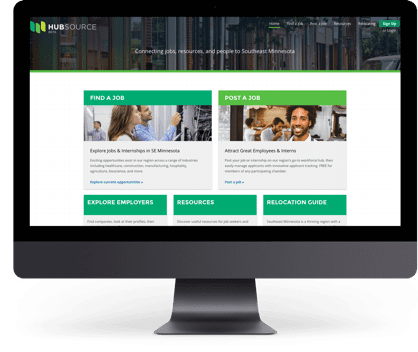
02:
Plan Smart -
Community Engagement &
Deep Research
Hubsource became a true community effort. Together with the chamber team, we surveyed hundreds of community leaders and key stakeholders to listen to their workforce challenges, goals, and ideas.
“The Hub” needed to not just help close the workforce gap but also reflect the culture of businesses our region, encouraging employers and job seekers to think in fresh ways about the role of company culture for employee attraction and retention.
For nearly a year, we dove deep into their pain points and did extensive research on existing 3rd party platforms, exploring over a dozen contenders together. The goal was to try finding something off the shelf that could be leveraged to address the goals of “The Hub” rather than building a custom solution. Custom was still plan B at this point.
03:
Plan Smart -
Brand
Strategy

We worked with the Chamber to come up with a name, brand scheme, logo, and domain (url). After hours and days of ideas, further research, discussion, legal review, and board approval, the name Hubsource was selected and our branding process began (it was briefly known as Hubworks).
The green color scheme was chosen to reflect diversity and growth, and the three elements reflect the key ingredients of the platform: jobs, resources, and people. The word “Hub” was retained in the name because it had been used as a nickname for the idea around the community for many years, and it still felt right.
We had figured out the branding, but were still searching for the right technology to support the vision.
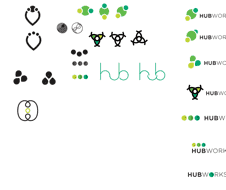

04:
Plan Smart -
Wireframes &
Prototype
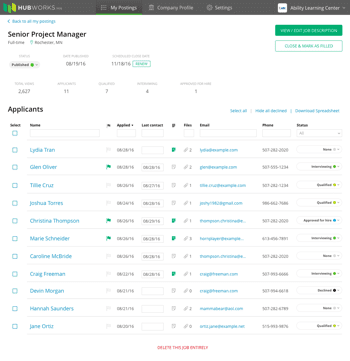
It became clear that no suitable off-the-shelf system existed. The closest alternative would cost over $100,000 annually and still was only half of what we needed. So we began designing a custom solution from scratch. The prototype design process can be messy at first, but through iteration, asking good questions, and getting user feedback, the solution was refined into something valuable and easy to use.
When we and the chamber team agreed the prototype was ready, we presented to the board. After some initial questions, it became clear we needed a more succinct way to demonstrate the vision. We worked through the night to create a demo video for two different board presentations. With this demo, Phase 2 was approved! We were excited to start building.
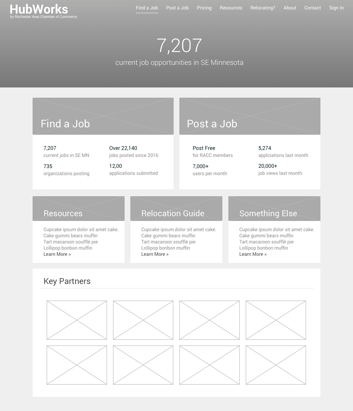
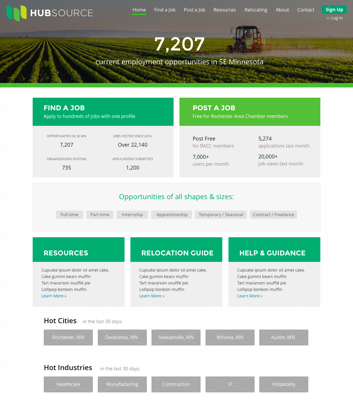



05:
Plan Smart -
Make it
Easy
How do you show a lot of information but still make it easy to discover, sort, and find an interesting job or internship? Making complex things look simple requires careful research, user testing, and fresh design.
Most businesses and community members we surveyed shared a common frustration for the leading job boards. These competing platforms had a clunky string of button clicks and dead-end old jobs still listed.
We carefully designed a clean job search interface and made the pages and job content load super fast to increase engagement, save time, and maybe even make the job hunt process fun. Behind the scenes we came up with a lot of little details such as auto-pausing job and internship postings after 30 days to reduce the amount of old information. With a simple confirmation, an employer can continue a listing if it's still active.
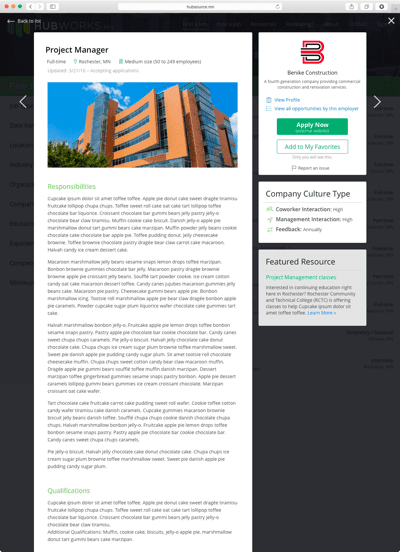
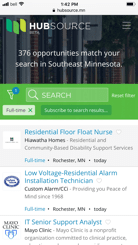


06: Plan Smart - Easy to Get Started
Finding employees is hard and time consuming. From the start, we know that one of our biggest challenges would be reducing friction as much as possible for the benefit of busy HR managers and small business owners.
We designed an easy onboarding workflow to help a first-time business get through the setup and posting process as quickly as possible. After their first post was live, we shared their excitement and showed them (through the automated onboarding flow) what else they can do to improve their success rate on Hubsource.
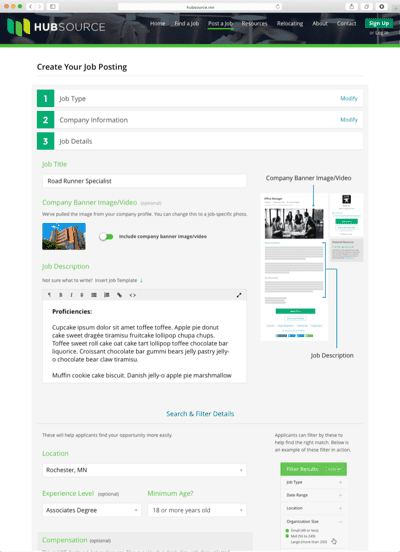
07:
Plan Smart -
Giving Users
Control
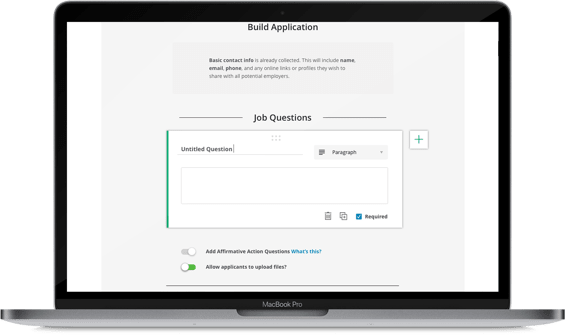
Employers loved the idea of being able to create their own application forms with their own questions, and being able to export that data later into a spreadsheet if they wanted.
Most job boards had very limited functionality in this area, or charged thousands of dollars for a business to unlock this feature. We empowered every small business and nonprofit to have this excellent feature built right in. No gimmicks.
08:
Do Well -
Company Culture
& Details
One key element of Hubsource was the idea of culture matching. Statistics show that if an employee feels aligned with a company's culture, they are much more likely to be productive and stick around long-term. We devised a company culture page feature that was (at the time) pretty unique to the job hunt industry. Our goal was to help small businesses shine from every angle.
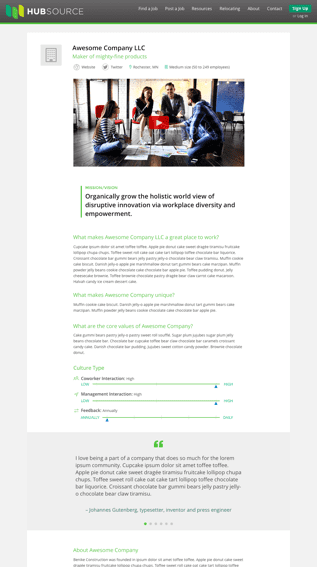
09:
Do Well -
Autosave. Autosave.
Autosave.
Another pain point we wanted to solve is to help business owners and HR managers never lose their work while writing the perfect job description. We built auto-saving like a Google document so that employers and job-seekers could pick up where they left off if they ever lost their internet connection or needed to come back later.


10:
Do Well -
Applicant
Tracking System
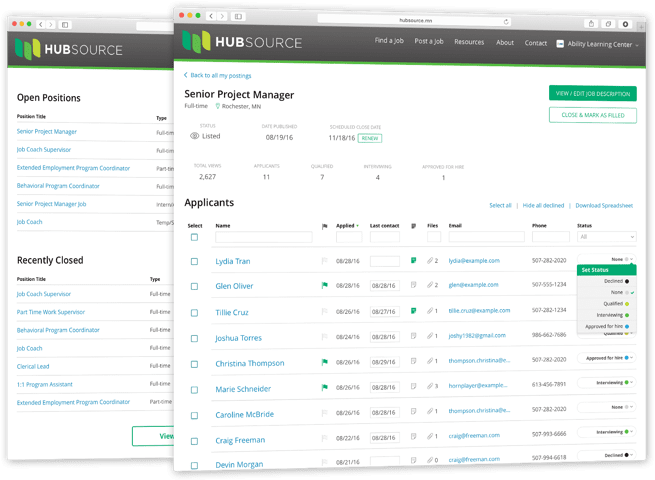
An even bigger pain point for small businesses and nonprofits is trying to manage all of their applications. We created an easy-to-use applicant tracking system (ATS) so employers can easily keep track of all applicants, change their status (such as declined, qualified, or interviewing) and even extra things like flag an application for further review or add personal HR notes. We even created a powerful messaging system so that employers can contact applicants through the process right inside the tool.

11:
Do Well -
Security &
User Roles
Roles within an organization can be complex, but are necessary to protect sensitive company information. We created a way for companies to assign Hubsource roles with varying levels of privilege, such as the ability to post jobs or communicate with applicants. We also created admin and chamber of commerce roles so that they can properly and securely manage top-level access, advertising, pricing for upsells, and more.
12:
Do Well -
Analytics
& Data
For both businesses and the chamber admins, we built simple tools to help decision makers understand their marketing efforts and make improvements. We also integrated with industry standard tools such as Google Analytics to provide further insights and more overall traffic data.
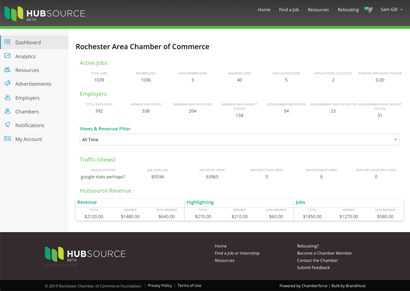
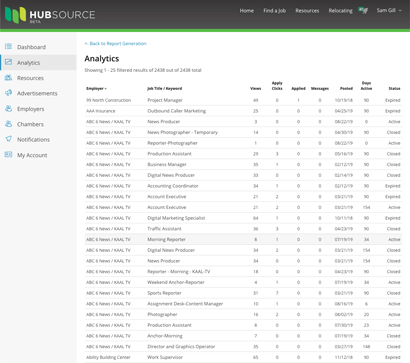

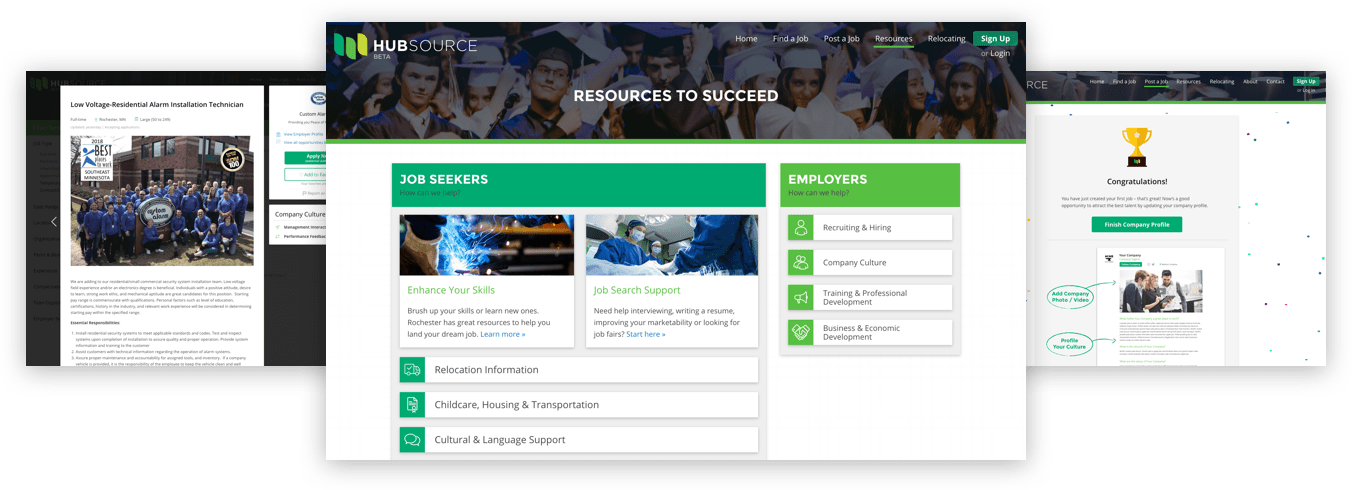
13:
Impact -
Thoughts
from the Team
BrandHoot provided nearly a year of thorough market research, alternative platform analysis, competitive analysis, and community interviews. They began the process by creating drawings, wireframing, and a prototype template, leading to the website’s buildout. It has connectivity to our chamber master software so that we can verify who’s a member and who isn’t when they sign up. Chamber members can post jobs for free.
The website is already public, and people are very pleased with it. We’ve had some formal feedback from HR professionals saying they’d expect to pay to use the tool and that it’s of great quality. BrandHoot is excellent, They don’t consider this just to be a job. They have a very personalized approach and really work as a partner to make things happen—they’re doing a really nice job.
Matt Bissonette Ed.D., VP, Rochester Area Chamber of Commerce
Wow. It's hard to put into words the magnitude, challenge, and excitement of this project. It was a huge vision and required several years of work, including thousands of hours of research, community input, user testing, problem solving, prototype design, and development. Launching and managing a huge Laravel and Vue.js application on a multi-server cloud environment has been icing on our nerd cake.
Some people doubted that our small team could ever successfully build such a big project. But our confidence remained in our experienced team, relentless problem solving, and can-do attitude. We're very pleased the platform and loved working with the Chamber to support a stronger community!
Brandhoot Team